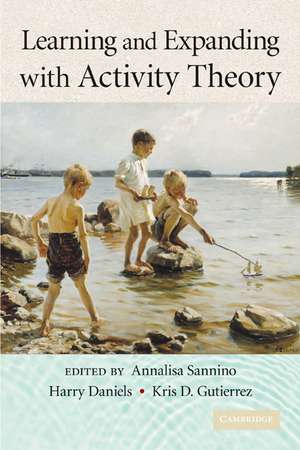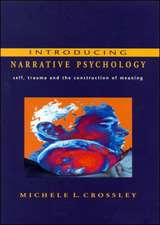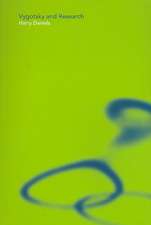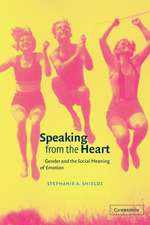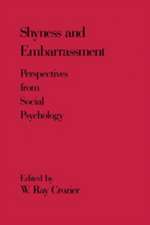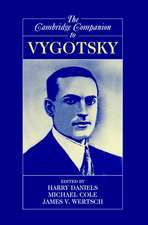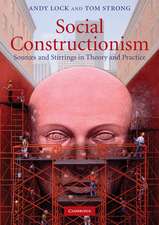Learning and Expanding with Activity Theory
Editat de Annalisa Sannino, Harry Daniels, Kris D. Gutiérrezen Limba Engleză Paperback – 16 aug 2009
| Toate formatele și edițiile | Preț | Express |
|---|---|---|
| Paperback (1) | 309.36 lei 6-8 săpt. | |
| Cambridge University Press – 16 aug 2009 | 309.36 lei 6-8 săpt. | |
| Hardback (1) | 514.30 lei 6-8 săpt. | |
| Cambridge University Press – 16 aug 2009 | 514.30 lei 6-8 săpt. |
Preț: 309.36 lei
Nou
Puncte Express: 464
Preț estimativ în valută:
59.20€ • 64.50$ • 49.88£
59.20€ • 64.50$ • 49.88£
Carte tipărită la comandă
Livrare economică 23 aprilie-07 mai
Preluare comenzi: 021 569.72.76
Specificații
ISBN-13: 9780521758109
ISBN-10: 0521758106
Pagini: 390
Ilustrații: 28 b/w illus. 3 tables
Dimensiuni: 152 x 226 x 18 mm
Greutate: 0.52 kg
Ediția:New.
Editura: Cambridge University Press
Colecția Cambridge University Press
Locul publicării:New York, United States
ISBN-10: 0521758106
Pagini: 390
Ilustrații: 28 b/w illus. 3 tables
Dimensiuni: 152 x 226 x 18 mm
Greutate: 0.52 kg
Ediția:New.
Editura: Cambridge University Press
Colecția Cambridge University Press
Locul publicării:New York, United States
Cuprins
1. Activity theory between historical engagement and future-making practice Annalisa Sannino, Harry Daniels and Kris Gutierrez; Part I. Units of Analysis: 2. Cultural-historical activity theory and organization studies Frank Blackler; 3. Uses of activity theory in written communication and research David R. Russell; 4. On the inclusion of emotions, identity, and ethico-moral dimensions of actions Wolff-Michael Roth; Part II. Mediation and Discourse: 5. Mediation as a means of changing collective activity Vladislav A. Lektorsky; 6. Digital technology and mediation: a challenge to activity theory Georg Rückriem; 7. Contextualizing social dilemmas in institutional practices: negotiating objects of activity in labour market organizations Åsa Mäkitalo and Roger Säljö; Part III. Expansive Learning and Development: 8. The concept of development in cultural-historical activity theory: vertical and horizontal Michael Cole and Natalia Gajdamashko; 9. Two theories of organizational knowledge and creation Jaakko Virkkunen; 10. Contradictions of high technology capitalism and the emergence of new forms of work Reijo Miettinen; 11. Spinozic re-considerations on the concept of activity: politico-affective process and discursive practice in the transitive learning Shuta Kagawa and Yuji Moro; Part IV. Subjectivity, Agency, and Community: 12. From the systemic to the relational: relational agency and activity theory Anne Edwards; 13. Expansive agency in multi-activity collaboration Katsuhiro Yamazumi; 14. The communicative construction of community: authority and organizing James R. Taylor; 15. Research leadership: productive research communities and the integration of research fellows Sten Ludvigsen and Turi Øwre Digernes; Part V. Interventions: 16. Who is acting in an activity system Ritva Engeström; 17. Past experiences and recent challenges in participatory design research Susanne Bødker; 18. Clinic of activity: the dialogue as instrument Yves Clot; 19. Epilogue: the future of activity theory Yrjö Engeström.
Recenzii
“This is a fine collection of papers on activity theory produced by internationally renowned scholars. The book provides a comprehensive overview of one of the most important focal points of activity theory, namely the relationship between theory and practice. It offers valuable insights from many perspectives and discusses the many issues that derive from grappling with this relationship. I would not hesitate to recommend this book to students, colleagues, and practitioners.”
– Bente Elkjaer, University of Aarhus, Denmark
“A superb collection of varied, important research focused on the possibilities for transforming human cognition, institutions, schools, workplaces and communities. This provocative work is grounded within the frameworks for the analysis of how ongoing practice within consequential activity transforms human social life developed by one of our most important contemporary social theorists: Yrjö Engeström. It offers a powerful alternative to views of cognition that focus on the individual, to our contemporary ways of theorizing learning and education, and a wonderful place to enter an important dialog on how humans as social creatures transform the social, cognitive and material worlds they inhabit through practice, a dialog that began with the work of Vygotsky, Luria and Leont’ev.”
– Charles Goodwin, University of California at Los Angeles
“A celebratory yet probing consideration of the work of one the best known cultural-historical activity theorists in the world, Yrjö Engeström, this edited volume sets a direction for debates in the field. At the same time, it extends Engeström’s analytic uses of activity theory as reflexive means for changing work practices. The editors skillfully highlight decisive points of theoretical progress and of practical advance.”
– Dorothy Holland, University of North Carolina at Chapel Hill
“Humanity develops primarily through cultural evolution, the ultra-fast process by which knowledge and tools are accumulated and handed over from generation to generation. One of the most important mechanisms of this process is the constitution and development of activity systems that organize people's actions in relation to shared objects. This book is a homage to Yrjö Engeström, the leading theoretician of learning as a vehicle of, and a vehicle for, cultural evolution. It is written by his best and closest intellectual partners. In the world according to Engeström, people transform themselves by transforming the activity systems which their acts are a part of. You may or may not subscribe to such a deeply materialistic view, but without finding out what happens at one of its hottest frontiers, the field of contemporary research on learning will remain closed to you. This book is actually your key to it.”
– Ference Marton, University of Gothenburg, Sweden
– Bente Elkjaer, University of Aarhus, Denmark
“A superb collection of varied, important research focused on the possibilities for transforming human cognition, institutions, schools, workplaces and communities. This provocative work is grounded within the frameworks for the analysis of how ongoing practice within consequential activity transforms human social life developed by one of our most important contemporary social theorists: Yrjö Engeström. It offers a powerful alternative to views of cognition that focus on the individual, to our contemporary ways of theorizing learning and education, and a wonderful place to enter an important dialog on how humans as social creatures transform the social, cognitive and material worlds they inhabit through practice, a dialog that began with the work of Vygotsky, Luria and Leont’ev.”
– Charles Goodwin, University of California at Los Angeles
“A celebratory yet probing consideration of the work of one the best known cultural-historical activity theorists in the world, Yrjö Engeström, this edited volume sets a direction for debates in the field. At the same time, it extends Engeström’s analytic uses of activity theory as reflexive means for changing work practices. The editors skillfully highlight decisive points of theoretical progress and of practical advance.”
– Dorothy Holland, University of North Carolina at Chapel Hill
“Humanity develops primarily through cultural evolution, the ultra-fast process by which knowledge and tools are accumulated and handed over from generation to generation. One of the most important mechanisms of this process is the constitution and development of activity systems that organize people's actions in relation to shared objects. This book is a homage to Yrjö Engeström, the leading theoretician of learning as a vehicle of, and a vehicle for, cultural evolution. It is written by his best and closest intellectual partners. In the world according to Engeström, people transform themselves by transforming the activity systems which their acts are a part of. You may or may not subscribe to such a deeply materialistic view, but without finding out what happens at one of its hottest frontiers, the field of contemporary research on learning will remain closed to you. This book is actually your key to it.”
– Ference Marton, University of Gothenburg, Sweden
Descriere
This book provides researchers with an accessible text that also supports the use of the classic tradition of activity theory.
